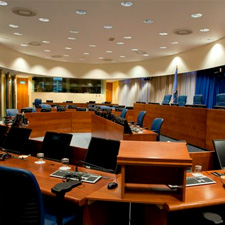
The Mechanism is mandated to carry out a number of essential functions of both the ICTY and the International Criminal Tribunal for Rwanda
A three-phase plan: the Completion Strategy
The plan, endorsed by UN Security Council Resolutions 1503 and 1534, anticipated the completion of investigations, trials and all work by the end of 2010. Investigations were completed in 2004. However, the late arrest of the remaining fugitives and the sheer complexity of certain cases warranted an extension of the original timeline.
Estimates as of early 2013 suggest that all trials will be concluded by mid-2016.
Transfer of cases / Support to local judiciaries
The ICTY focuses on the most senior leaders suspected of war crimes. The cases of intermediate and lower-level accused were transferred to competent national jurisdictions in the former Yugoslavia. These domestic mechanisms can also initiate cases without ICTY involvement.
ICTY support has been very important in strengthening the capacity of national judiciaries in the region. The sharing of expertise and evidentiary materials will help to ensure an effective transition from the international court to domestic judiciaries.
The International Residual Mechanism for Criminal Tribunals (IRMCT)
The United Nations IRMCT was established in 2010 by Security Council Resolution 1966 as part of the Completion Strategy. The Mechanism is mandated to carry out a number of essential functions of both the ICTY and the International Criminal Tribunal for Rwanda (ICTR). It is a small, temporary and efficient body tasked with continuing the jurisdiction, rights, obligations and essential functions of both Tribunals, as well as maintaining their institutional legacies.
|
The IRMCT is mandated to perform the following tasks: |
|
| Ad hoc functions | Continuing functions |
|
|

